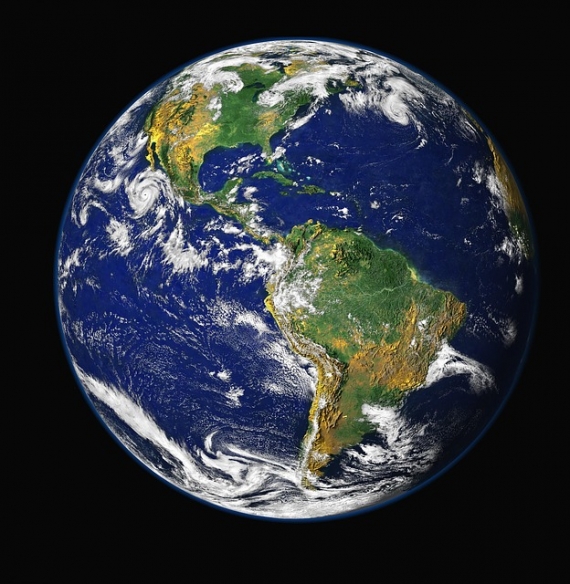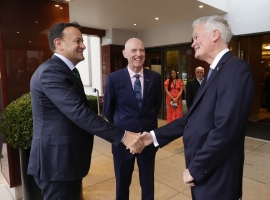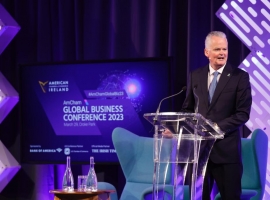
The global economy is in a broad-based upturn with core inflation at last on the rise, according to a majority of economists polled by Reuters, but the worldwide gains remain under threat from trade protectionism.
Those findings come as the semi-annual gathering of finance officials from the International Monetary Fund, the World Bank and the Group of 20 major economies kicks off in Washington, where the case against protectionist trade policies is expected to be a major theme.
Recent optimism on the global economy found in the Reuters poll is based on manufacturing and trade gains in some major economies and is in line with the IMF's upgraded projections in its latest quarterly World Economic Outlook.
"For the first time in five years, all the major economies seem to be growing in sync," noted Ajay Rajadhyaksha, head of macro research at Barclays.
"The global trade recession is over, fears of deflation have faded even as inflation pressures seem muted and the worst fears on global trade -- such as the U.S. immediately imposing tariffs on major trading partners -- have not come to pass."
The Reuters polls of over 500 economists across Asia, Europe and the Americas, however, suggested that concern remains about trade nationalism.
But on the economy as a whole, it revealed upgrades, or no change to growth forecasts compared with previous months, as well as a slightly stronger inflation outlook across most countries.
Global growth is forecast to rise to 3.4 percent this year, followed by 3.5 percent next -- back above the pace it was expanding at before the financial crisis struck almost a decade ago.
While the latest consensus was slightly lower than the IMF's projection of 3.5 percent global growth in 2017, the range of forecasts in the poll pointed to a slightly more optimistic outlook this time around, with higher highs.
Global trade is on track to expand 2.4 percent this year after growing at the slowest pace since the financial crisis, just 1.3 percent, in 2016, according to the World Trade Organization.
WTO director-general Roberto Azevedo said last week there was "deep uncertainty" about economic and policy developments, particularly in the United States and clarity was needed on U.S. President Donald Trump's "America First" trade policies.
Similar concerns were voiced by an overwhelming majority of economists who answered an additional question in the Reuters poll, suggesting broad agreement among economists on the need to resist protectionism.
While U.S. Commerce Secretary Wilbur Ross said such warnings were "rubbish," because the United States was less protectionist than its trading partners, Trump has made reducing trade deficits a key focus of his economic agenda to try to grow U.S. manufacturing jobs.
Doubts have risen, however, not only about Trump's ability to push through reflationary policies, but also around his other promises as confidence has eroded after the U.S. administration's failed attempt to overhaul healthcare.
"A rise in trade protectionism is still one of the major threats, even though it would appear that the likelihood of this taking place having subsided a bit," said Elwin de Groot, senior market economist at Rabobank.
Protectionism, though, is not restricted just to Washintgon. There is a rise in nationalist sentiment worldwide, starting with Britain's vote last year to leave the European Union and including various candidates in France's presidential election.
Euro zone economic growth is forecast to be steady despite the potential disruptions.
"While most of the attention in Europe has been on national elections, the economy has been improving steadily, helped by a rebound in business investment and contributions from household consumption and public spending," said Barclays' Rajadhyaksha.
"Meanwhile, the effect of the Brexit vote on both the UK and the euro area so far has been less significant than most expected."
Indeed, previous Reuters polls showed a hard Brexit would cause the most damage to Britain's economy, but the latest survey showed growth forecasts were upgraded for the UK from last month.
"Plenty of political, geopolitical and policy uncertainties persist... and changes in the world order will no doubt unfold in the coming years. But for now there is no denying that the data globally have been better than expected," Janet Henry, chief economist at HSBC, wrote in a note.
"Inevitably there is a sense that things are finally returning to a 'more normal' environment whereby the extraordinary world of near-zero rates and frequent doses of quantitative easing may no longer be required to sustain even a mediocre expansion." (Reuters)
Source: www.businessworld.ie

















